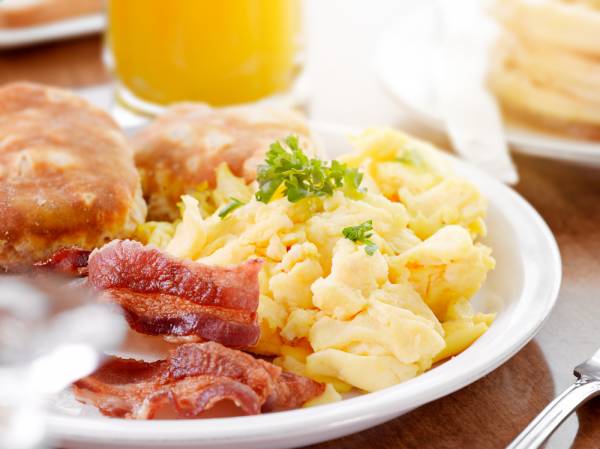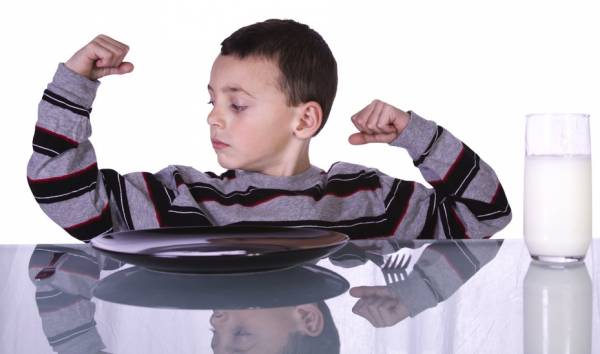As a personal trainer and a strength and conditioning coach who works with adolescent athletes, I am astounded not only by the number of people who do not eat breakfast on a regular basis, but also by the number of people who eat an unhealthy breakfast on a regular basis. Unfortunately, many of those who skip breakfast are those who need it most – young and growing athletes.
What Breakfast Does
Literally, breakfast means that you are “breaking the fast” from your last meal or snack. Many people believe that because they were sleeping, they do not need to refuel their bodies. But while you are sleeping, the body is repairing, restoring, and detoxifying itself from the day’s internal and external stresses. The breakfast meal serves to refuel the body after fasting, as well as to fuel the body for the day ahead.
While a cup of coffee or tea may be the easiest way to “eat” breakfast, it is absolutely imperative that the body receives protein, carbohydrates, and a little bit of good fat. So one of the best things you can do for your body is to eat breakfast. And while this truth applies to all, it is that much more important for growing athletes who expend copious amounts of energy in their sports performance.
Breakfast Benefits
Did you know that breakfast eaters demonstrate higher levels of concentration (in school and on the field), increased problem-solving capabilities (in school and on the field), and a higher overall mental performance (in school and on the field) than non-breakfast eaters?
As well as increasing an athlete’s energy level, breakfast also helps boost metabolism throughout the day. Because you are starting the day by fueling yourself, your body is not in a state of calorie deficit. This drastically reduces the chances of overeating later in the day. And that’s only a little of the good news. A good, healthy breakfast also helps to maintain a steady blood sugar level, which can help prevent aimless snacking on high-carbohydrate or high-fat food later in the day.
According to Jen Ochi of the Cleveland Clinic, a healthy breakfast for a teen athlete should have between 500 and 750 calories and should include about fifty percent carbohydrates, thirty percent protein and twenty percent fat.
Even the Pros Do It
And who can argue with the success of breakfast-eating athletes such as Mia Hamm, Derek Jeter, or Michael Phelps?
- Retired soccer star Mia Hamm revealed that her breakfast usually consists of a breakfast burrito, filled with egg whites, tomato, and spinach on a whole-wheat tortilla or a breakfast sandwich made of whole-grain bread with egg, avocado, and tomato.
- New York Yankee, Derek Jeter has reported his breakfast consists of an egg-white omelet with ham and cheese, or a vegetable omelet with broccoli or red and green peppers, or, on occasion, oatmeal.
- And there are the legendary breakfasts of Olympic gold medalist, Michael Phelps. The Olympic swimmer said as a teenager he ate three fried-egg sandwiches with cheese, lettuce, tomato, fried onions, and mayonnaise, plus an omelet, grits, French toast, and pancakes.

Planning Ahead Helps
Still arguing the benefits of eating breakfast, citing that you are too pressed for time? Then you, as an athlete, are robbing your body of the nutrients needed for good health, as well as robbing yourself of the energy needed to perform optimally during workouts or competitions. We all have the same amount of time in a day to do or not do something. And just as we find time to eat lunch, have snacks, and eat dinner, we should find time to eat a healthy breakfast.
To help ease the early morning rush and to still fit breakfast into your day, try these night-before preparation tips, and a healthy breakfast will be yours when you wake up:
- Cook ahead. Make breakfast the night before and reheat, if necessary, in the morning.
- Set the stage. Figure out what you will eat for breakfast the night before. Then, set out dry ingredients and any bowls, equipment, or pans needed, so they will be ready for use in the morning.
- Pack it up. Make a to-go breakfast the night before. In the morning, grab it and go.
- Use leftovers. Last night’s dinner can be revisited and reheated for your breakfast.
Healthy Breakfast Ideas
Still, this is all easier said than done. Young athletes know they should eat breakfast, but they may be limited to options based on the food available in the household. They may be dependent on school breakfasts, or they may not know how to put a nutritious breakfast together.
Jim Carpentier, a certified strength and conditioning expert, offered some useful, healthy, and quick ideas (under five minutes preparation time) for youth athlete breakfasts in his article How to Create the Breakfast of Champion Athletes:
- A handful of nuts or seeds with raisins, a glass of milk or string cheese, and a buttered whole-grain bagel (690 calories)
- Apple slices topped with peanut butter, buttered whole-grain toast, and a glass of milk (455 calories)
- Banana with a cup of plain yogurt, mixed with nuts (435 calories)
- A bowl of whole-grain cereal and milk, topped with raisins and nuts, and a glass of milk (635 calories)
- Two hard-boiled eggs, a buttered whole grain bagel, orange slices, and string cheese (610 calories)
- Five-minute egg sandwich: Blend two eggs with a half-cup of milk in a bowl. Add a pinch of salt and pepper. Place the bowl in a microwave and cook for three minutes (depending on your microwave). While the eggs are cooking, put two slices of whole grain in a toaster. The toasted bread and eggs should be done at nearly the same time. Use a spoon to remove the eggs from the bowl and slide them between the two slices of toast. Have a piece of fruit with the sandwich (580 calories).
- High-calorie meal for athletes who want to gain muscle mass: Oatmeal, two eggs, a banana, two glasses of whole milk, and a handful of almonds (885 calories).

Conclusion
What did you eat for breakfast today? The importance of eating a healthy breakfast cannot be overstated or underestimated. And yet, according to Dr. W. Cochran, vice chairman of the Department of Pediatrics of the Geisinger Clinic in Pennsylvania, approximately eight to twelve percent of all school-aged kids skip breakfast.
The statistics only get worse, as children enter adolescence. By the time kids enter adolescence, as many as twenty to thirty percent have completely given up the morning meal. Don’t fall into this trap. Whether you are fueling for the day or fueling for performance, breakfast truly is the most important meal of the day. So, as millions of moms say each day, “Sit down and eat your breakfast.”
References
1. Nancy Clark, Breakfast: The Most Important Meal of an Athlete’s Day, Active.com, Accessed 8/10/14.
2. The Case for Eating Breakfast, Healthy Children Magazine, 2009. Accessed 8/11/14
3. Healthy Breakfast Ideas: What Pro Athletes Do In the Morning, Huffington Post, 6/1/2013. Accessed 8/10/14.
4. Mike Samuels, Healthy Breakfast Ideas for Teen Athletes, LIVESTRONG, January 11 2013. Acessed 8/10/14.
5. Jim Carpentier,How to Create the Breakfast of Champion Athletes, STACK, January 2013. Accessed 8/09/14.
Photos courtesy of Shutterstock.






